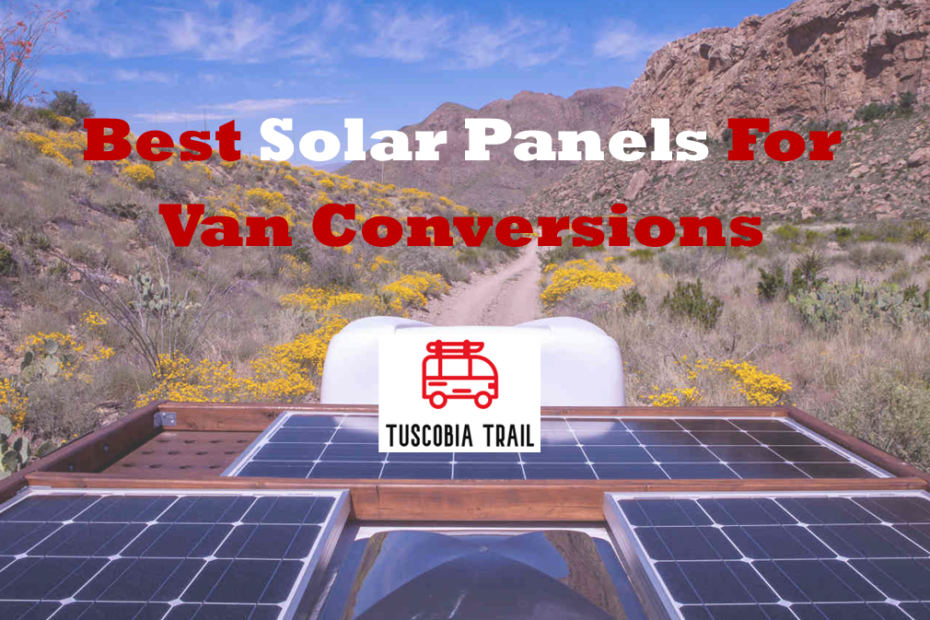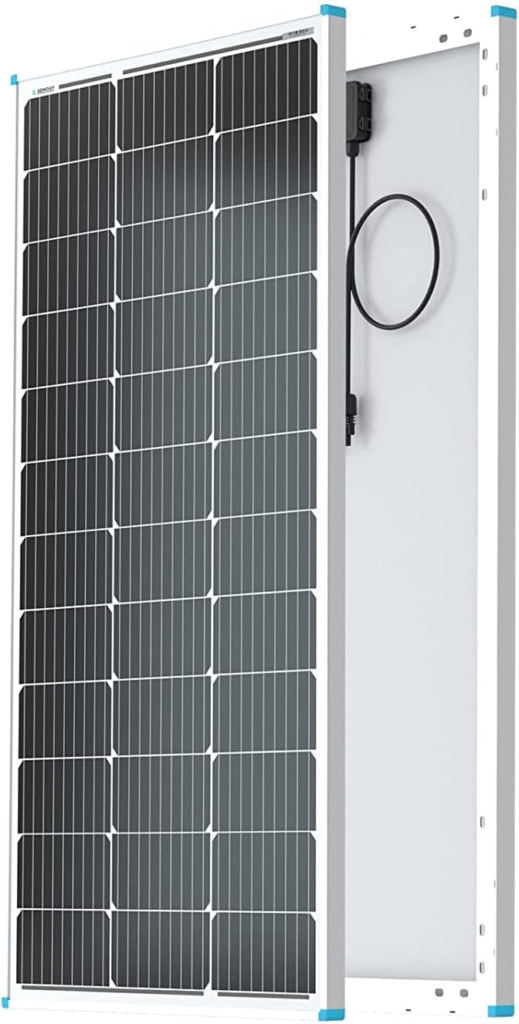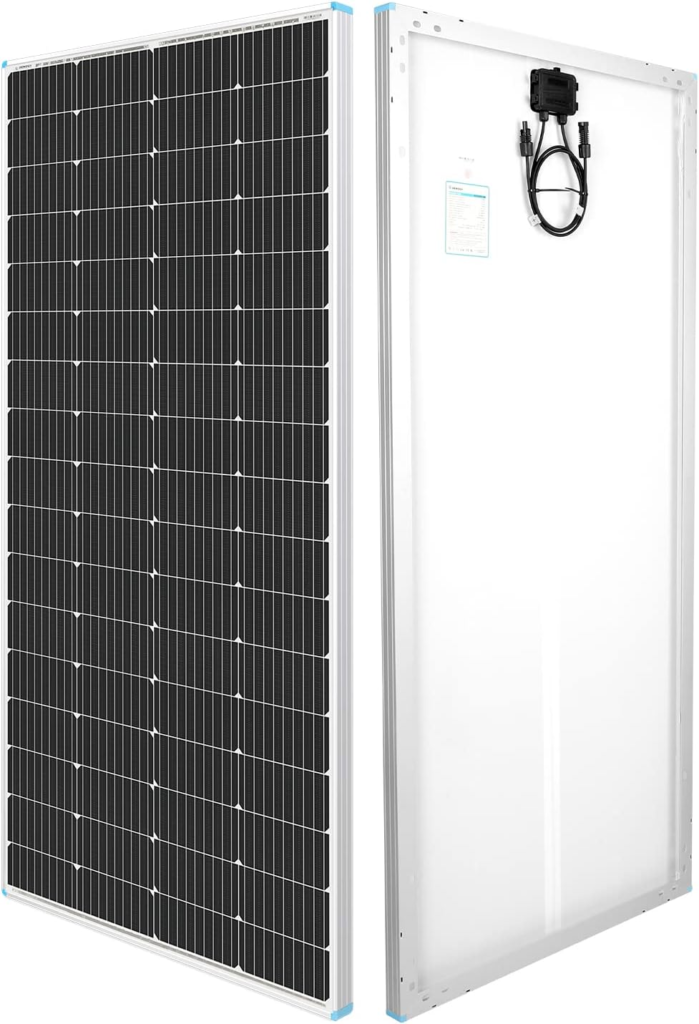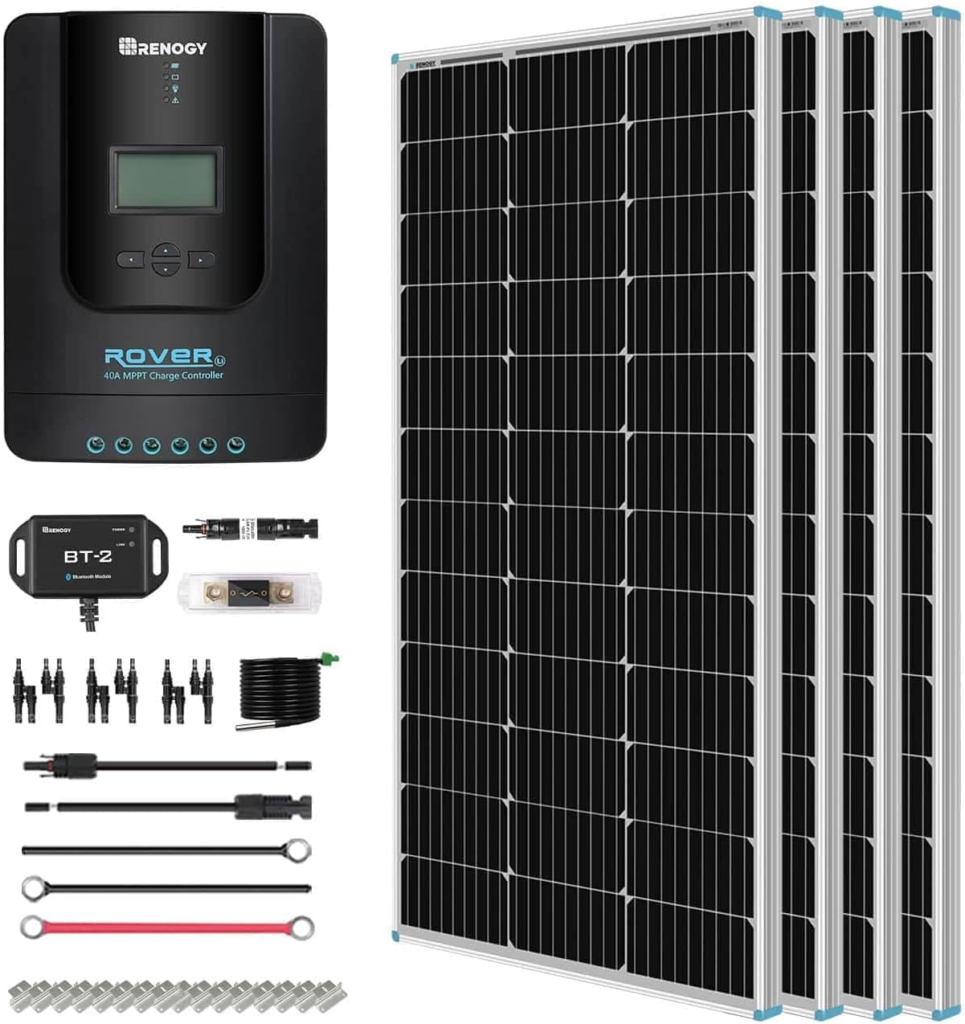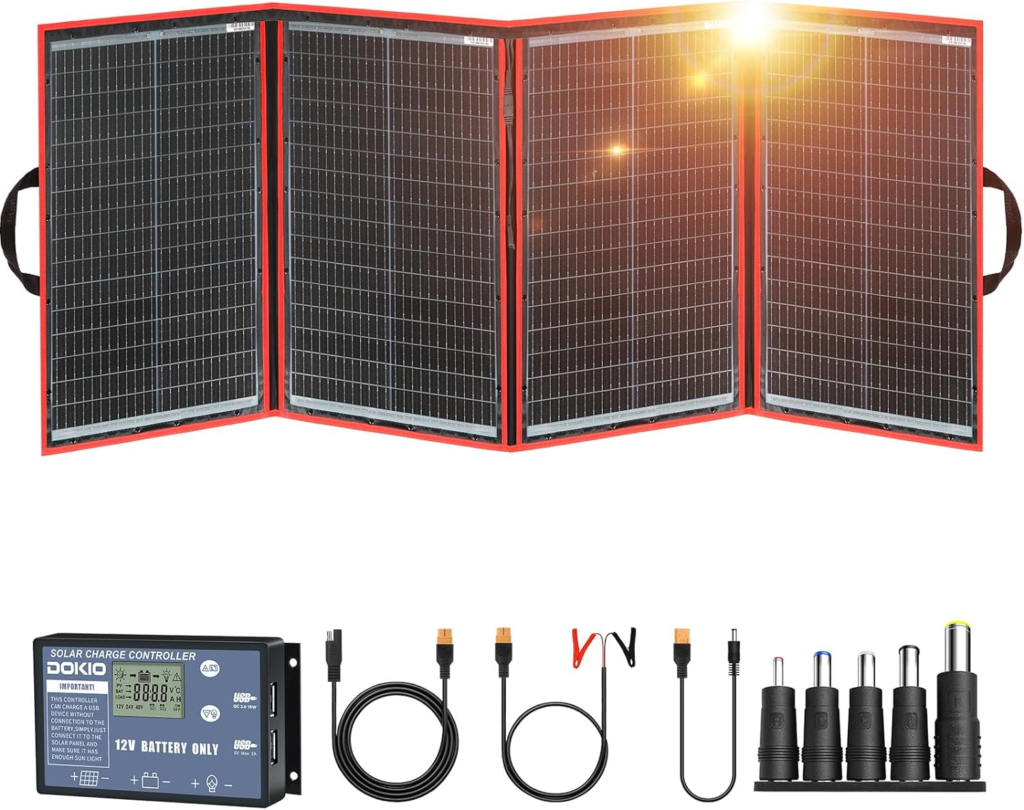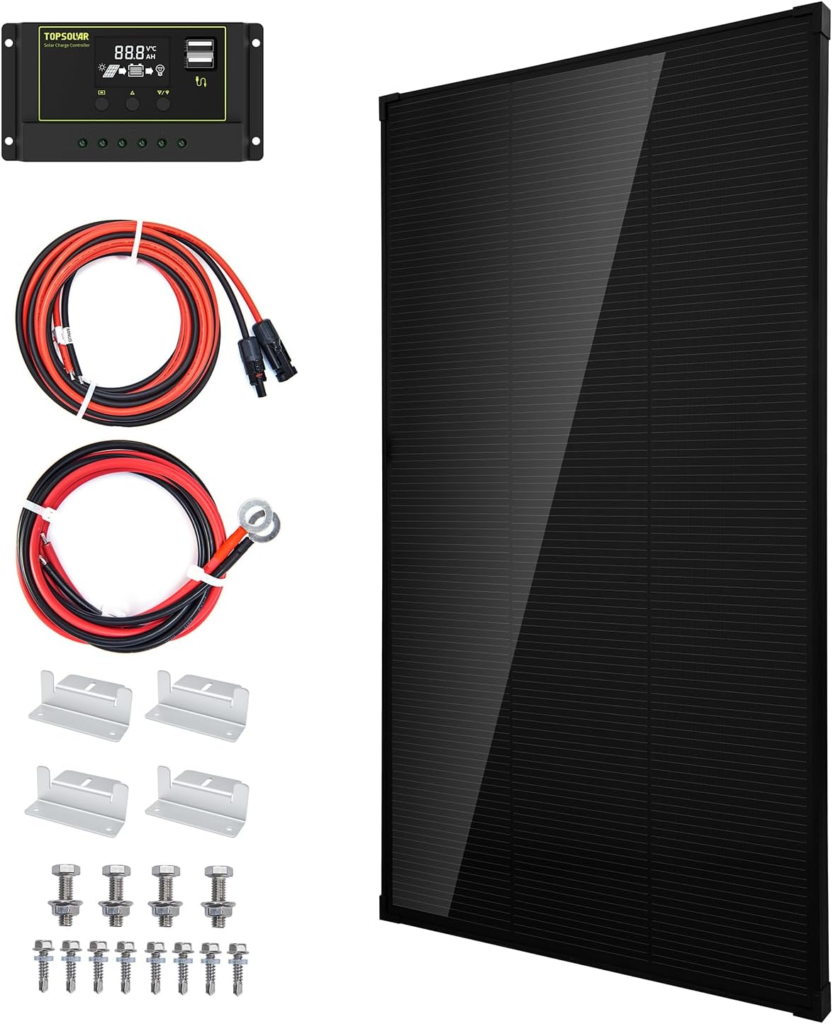Sustaining the freedom that van life offers often hinges on the right choice of solar panels. With so many options on the market, identifying the best solar panels for van conversions can be daunting.
Before adding solar to our van, we explored the best options that combine efficiency with practicality, making your van conversion as energy-independent as possible. We also considered whether solar panels were worth it?
Whether parked in the urban jungle or nestled in nature, your power supply will be consistent and reliable. And we wanted to know we would always have a powered leisure battery or topped up power pack.
From rooftop installations to solar suitcases, our guide from experience helps navigate you through the choices, ensuring your van is powered wherever you roam.
Whether you seek to maintain a low profile or harness maximum energy, we talk you through how to match solar power to your van’s unique needs and select the perfect solar setup for your van.
With our expertise in doing so, we’ll try to help avoid common pitfalls and ensure your converted van is equipped with a solar system that’s as resilient as you are, and turns the sun’s power and into power in your home on wheels.
Featured Picks: Top Camper Van Solar Panels for Van Enthusiasts
For van enthusiasts seeking the ideal solar solution, we’ve curated a selection of top-performing panels. Our detailed roundup ensures you’ll find the perfect match for your camper van or RV.
1. Renogy 100W Mono Solar Panel – Compact Efficiency
The Renogy 100W Mono Solar Panel is a stellar choice for van roofs with limited space. Its monocrystalline cells offer high efficiency, and the compact design means you can maximize your power output even when the area is at a premium.
The panel’s robust construction withstands the rigors of road travel, making it a reliable addition to your van life adventures. These panels are also compatible with Renogy’s solar kits, allowing for easy expansion of your system should your energy requirements grow.
Pros
- The compact design perfectly fits smaller van roofs
- High-efficiency monocrystalline cells for maximum power in minimal space
- Easy to install
- The potential for adding more panels makes it flexible
Cons
- May not meet the needs of those with higher energy consumption
2. Renogy 100-Watt Flexible Solar Panel – Adaptability on the Move
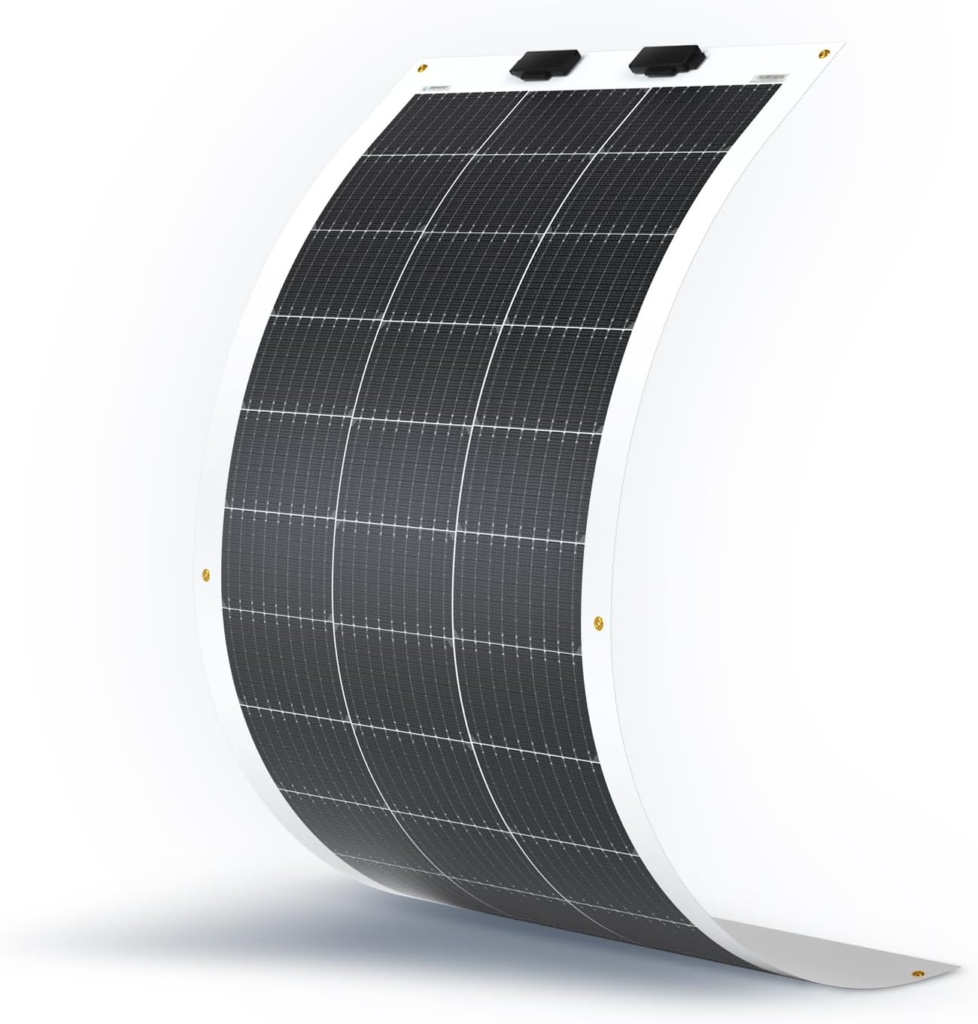
Renogy’s 100-watt Flexible Solar Panels are super bendable, making them an ideal choice for contoured van roofs. These ETFE-coated, best-flexible panels can conform to subtle curves without compromising performance.
With a high degree of efficiency and the ability to withstand high temperatures up to 248 degrees, they’re designed for the adventurous van lifer.
Installation is simplified as these panels can adhere directly to the surface without the need to drill holes, preserving your van’s integrity.
Available in sizes up to 175W, they offer a scalable solution to meet your energy needs while promoting an aerodynamic profile for your van.
Pros
- Their adaptability to curved surfaces
- High-temperature resistance
- Efficient energy conversion
- The ease of installation without drilling protects your van’s exterior
Cons
- Vulnerability to punctures or damage from debris
3. Renogy Solar Panel 200 Watt 12 Volt
The Renogy Solar Panel 200 Watt 12 Volt kit is a robust choice for van dwellers looking for a balance between power and space-saving.
This set of monocrystalline solar panels provides a substantial wattage bump for energy-intensive setups while still conforming to the limited roof real estate of a van.
The sleek, durable design ensures longevity and reliable performance under various environmental conditions.
Each panel weighs in with a manageable heft, allowing for secure mounting without overwhelming your vehicle’s structure.
The panels’ performance in low-light conditions means you’re less likely to experience significant power drops on overcast days, maintaining a steady energy supply for your needs.
Pros
- Highly efficient for energy production
- Their sturdy construction translates to lasting performance
- Function well in diverse lighting conditions
- Compatibility with on-grid and off-grid inverters
Cons
- The panel weighs more than smaller options
4. Renogy 400W Complete Solar Kit – All-Inclusive Power Solution
If you’re looking to wire solar in your van with the utmost convenience, the Renogy 400W Complete Solar Kit is your go-to choice.
This all-encompassing kit is designed to power your van’s electrical systems efficiently, providing a robust 400W solar panel array that is the heart of your solar power system.
The kit includes lifepo4 batteries known for their reliability and long life, a 2000W pure sine inverter for clean and stable power, and all the necessary wiring, connectors, and fuses. It’s like receiving a power plant in a box, tailored for the unique demands of van life.
Pros
- The Bluetooth modules put power usage monitoring at your fingertips
- Easy installation process
- Complete kit to start enjoying power on the spot
- Generous output to run several appliances
Cons
- High premium price tag
5. DOKIO 220w 18v Portable Foldable Solar Panel Kit
When flexibility and efficiency are key, the DOKIO 220w 18v Portable Foldable Solar Panel Kit fits the bill.
This kit is a powerhouse among portable campervan solar panels, designed to deliver more power at various sun angles compared to lower-quality solar cells.
Expect up to 30% more power generation, a significant boon when you’re relying on the sun to fuel your off-grid lifestyle.
It’s a solid choice for those who want to ensure they’re getting the most out of every ray of sunshine. Fold it out when the sun is shining and pack it away with ease as you continue your journey.
Pros
- Exceptional performance – Up to 30% more power generation
- Space saving
- High-quality solar cells maximize power generation
- The foldable design for easy storage and transport
Cons
- Great for supplementing instead of being the main power source
6. ECO-WORTHY Bifacial 195 Watt 12 Volt Solar Panel
If you’re looking for a solid, reliable solar solution for your van, the ECO-WORTHY Bifacial 195 Watt 12 Volt Solar Panel is a worthy contender.
This rigid monocrystalline panel is built to withstand the rigors of the road, offering durability along with impressive energy efficiency.
The bifacial design allows for the absorption of sunlight from both sides, increasing the potential for power generation even in less-than-ideal conditions.
It’s an investment in reliable power, designed to keep you charged up for all your van adventures. This panel’s monocrystalline cells are efficient and robust, making it a dependable choice for those serious about their solar power.
Its sturdy construction means it can handle the bumps and knocks of life on the move, ensuring that your investment is protected.
Pros
- Cost-friendly
- The bifacial design maximizes energy capture
- The rigid monocrystalline construction survives the elements
- Performs well in partial shade
Cons
- Its rigid design may limit installation options
7. Topsolar Solar Panel Kit 170 Watt
The Topsolar Solar Panel Kit 170 Watt is a superb choice for van lifers looking for a balance between performance and price.
This rigid monocrystalline kit includes premium SunPower solar cells, which are among the best solar panels for van life, boasting a high efficiency of 25%.
The kit comes with mounting hardware, allowing you to secure your investment safely to your campervan and RV.
It’s built to withstand harsh environments, making it as rugged as the adventures you’ll take on. Moreover, the Topsolar kit is designed to make electricity to power your van’s needs accessible and reliable.
Pros
- Exceptional efficiency and durability
- High-quality cells offer the best power output
- The inclusion of mounting hardware makes installation a breeze
- Strong tempered glass and an aluminum frame construction
Cons
- The rigid design may not work with all installation setups
Buying Guide: Solar Panel Types for Van Conversions
Understanding the nuances of solar cells is key to a successful van conversion. High-efficiency solar cells can significantly increase your power output, impacting how much energy you can generate and store for your adventures on the road.
Monocrystalline Solar Panels
Monocrystalline solar panels are the go-to for van enthusiasts seeking efficiency and durability. A setup of 4 x 100w panels is a popular choice, offering a balance of power and space-saving on your van’s roof.
These panels are crafted from a single crystal structure, making them one of the most efficient options available, capable of generating ample power even in limited sunlight.
Choosing 100w panels for your van conversion means you can optimize your roof space without sacrificing power.
Whether you’re outfitting a compact van or a spacious mobile home, a quartet of monocrystalline panels can provide a reliable energy source for all your electrical needs.
Polycrystalline Solar Panels
Polycrystalline solar panels are another viable option for van conversions. While they are generally less efficient than their monocrystalline counterparts, they offer a cost-effective solution for those on a budget.
Planning for 4 x 100w panels on your roof space can be a smart move, especially if you’re looking to maximize power without breaking the bank.
These 100w panels are made from multiple silicon fragments melted together, which can slightly reduce efficiency but still provide a robust power source.
For van lifers who are mindful of their spending, polycrystalline panels offer a balance between performance and affordability.
CIGS Flexible Solar Panels
CIGS flexible solar panels, made from copper indium gallium selenide, are super adaptable panels. They can conform to the contours of your van, making them an excellent choice for curvy roofs.
These panels can be easily installed with VHB tape, eliminating the need for drilling and reducing wind resistance.
While CIGS panels are not as efficient as standard monocrystalline panels, their flexibility allows for creative placement, even on storage boxes or curved surfaces. Their lightweight nature also means less strain on your van, keeping it agile for all your travels.
Rigid vs Flexible vs Portable Panels
Van conversions require a careful decision between rigid and flexible solar panels, each with its own set of benefits and drawbacks.
Rigid panels, often made from standard monocrystalline cells, are durable and highly efficient, ideal for permanently mounted setups on a flat roof space than has been properly sealed.
Flexible panels, on the other hand, are lightweight and can be affixed to curvy roofs, like those of a Ford Transit, using adhesive tapes such as VHB. However, they tend to be less durable and less efficient than their rigid counterparts.
Portable panels offer the advantage of being paired with a portable power station, providing extra energy when needed and the flexibility to position them for optimal sun exposure.
Assessing Rigid Solar Panel Pros and Cons
Rigid solar panels, built with durable frames and high-performance solar cells, withstand the rigors of the road, ensuring a long service life.
They offer high efficiency and are designed to maximize power output. These panels are typically more cost-effective in the long run due to their longevity and reliability.
However, they can be heavier and require a more involved installation process, which might not be suitable for every van’s roof or owner’s preferences. Their robust construction makes them less susceptible to damage from environmental factors.
But, their weight and rigidity can make them less versatile than flexible or portable options. Rigid panels are best for van lifers who have a suitable roof space and desire a fixed, powerful solar setup.
Flexible Solar Panel Advantages and Limitations
Flexible solar panels are celebrated for their versatility and ease of installation. They can adhere directly to the van’s roof, even if it’s curved, using strong VHB tape, creating a sleek, low-profile look that’s perfect for stealthy urban van dwellers.
Their lightweight design reduces drag and overall weight, which can be advantageous for fuel efficiency and handling.
However, the trade-off for their flexibility is often a decrease in efficiency and durability compared to rigid panels.
They are more prone to wear and tear and might require replacement sooner. Flexible panels are an excellent choice for those valuing discretion and minimalistic design over maximum energy output.
Portable Solar Panels – On-the-Go Power
Portable solar panels offer the ultimate flexibility for van lifers who are always on the move. They can easily be set up and repositioned to catch the best sun angles, optimizing solar intake throughout the day.
For those who don’t want to commit to a permanent installation or who have limited roof space, portable panels are a convenient solution.
With the ability to be stored away when not in use, portable panels paired with a portable power station can be a game-changer for energy on demand.
They’re perfect for those who occasionally need extra power or want the option to expand their solar capacity without modifying their van’s roof.
Selecting the Ideal Solar Panels for Your Van
Choosing the best solar panels for your van is not just about wattage; it’s about understanding your van’s roof and your electrical usage.
High-efficiency solar cells can make a significant difference in your power output, which is crucial for maintaining your van life comforts.
Determining Your Solar Power Needs: Calculating Required Wattage
To ensure your van’s energy needs are met, start by listing all electrical appliances you’ll use and their wattage.
Next, estimate the total hours each device will run daily. Multiply the wattage by the hours for each item, then sum these figures to find your daily wattage requirement.
Remember, it’s wise to add a buffer of about 20-25% to accommodate for energy loss and inefficiencies.
For instance, if your fridge uses 50 watts and runs for 24 hours, that’s 1200 watt-hours per day. Add lighting, charging devices, and other essentials, and your total might reach approximately 2000 watt-hours. With the buffer, you’ll aim for a solar setup that can generate around 2500 watt-hours daily.
Panel Size and Roof Compatibility
Panel size is crucial in van conversion since roof space is limited. Take precise measurements of your van’s roof, considering any vents, antennas, or other obstructions.
Most standard vans can fit two large panels or several smaller ones. The balance between the highest wattage panels that fit and leave room for future upgrades or additional gear like a roof box or deck.
Compatibility extends beyond just fitting the panels on your roof. It’s about ensuring they can be securely mounted and that the weight distribution doesn’t affect your van’s handling.
Lightweight panels might be preferable for larger arrays to minimize stress on the vehicle’s structure.
Mounting Methods and Considerations
Mounting solar panels to your van requires careful consideration for both security and aerodynamics. Traditional mounting brackets provide a sturdy base but may raise the panels, impacting fuel efficiency due to increased drag.
Low-profile adhesive mounts offer a sleeker look and less wind resistance but may not be as strong. Always check the panel manufacturer’s guidelines for mounting and adhere to them strictly. Additionally, consider the ease of removal or adjustment.
You may need to access the van’s roof for maintenance or to clean the panels for optimal performance. Mounts that offer easy detachment or pivoting can be advantageous for long-term usability and maintenance.
Stealth Aspects for Urban Dwellers
For those who partake in stealth camping in cities, the solar setup must be as inconspicuous as possible. Black panels tend to blend in better with the van’s roof, drawing less attention.
Positioning them flat against the roof can also help maintain a low profile, making your van appear less like a camper and more like a standard vehicle.
Remember that being stealthy doesn’t mean sacrificing efficiency. Ensure your panels still receive ample sunlight and that any shades or covers can be quickly removed when you’re parked in a discreet location to harness solar power without drawing attention.
Balancing Quality with Budget
When selecting the best campervan solar panels, there’s a fine line between quality and affordability. High-efficiency panels may cost more upfront but can provide better performance in limited spaces.
Conversely, budget-friendly options might require more roof space to meet your energy needs and could be less durable over time.
Consider the long-term benefits of investing in higher-quality panels, such as improved output and longer warranties. However, don’t let the price tag be the only factor.
Research reviews and compare specifications to ensure you’re getting the best value for your investment.
The Debate: Solar Panel Kits vs Individual Components
Choosing between solar panel kits and individual components for your van conversion is a critical decision. If you’re installing solar panels on your van, the roof space available is a determining factor.
Kits offer an all-in-one solution but might not fully utilize your van’s roof space like individually selected components could.
Best RV solar panel kits, like those from Renogy, often include polycrystalline panels made from multiple silicon crystals, providing a balance of efficiency and cost.
Pros and Cons of Investing in Solar Kits
Investing in solar kits for your camper van solar system can be an appealing option for many van lifers. These kits typically come with everything needed to set up your system, including mounting brackets and standard solar panel units.
The convenience of having matched components and the ease of setup can be a significant advantage, especially for those new to solar.
Advantages of Solar Kits
- They offer a streamlined approach to setting up a camper van solar system.
- They have everything from fixed solar panels to the wiring and controllers contained in one package
- Beginner-friendly – everything included
- Premium solar kit ensures components work – reducing the risk of incompatibility issues
- Tailored to different power needs, making it easier to choose the right setup for your van
- Usually include detailed instructions – saving time and reducing stress
- Streamlined customer service – you only deal with one customer service team
Disadvantages of Solar Kits
- Fixed solar panels in kits may not utilize your van’s roof space as effectively as individually selected panels Premium solar kits can come at a higher upfront cost
- Kits may limit the customization of your setup
- If one component in the kit fails it could potentially affect the warranty of the entire system
Making the Right Choice – Solar Kit or Separate Parts?
Deciding between a solar kit and separate parts for your van conversion hinges on several factors. If you’re considering CIGS panels, known for their lightweight and flexible properties, you might find that a kit doesn’t offer this specific type.
Copper indium gallium selenide, the material used in CIGS panels, allows for more installation versatility, which could be crucial in maximizing limited roof space.
On the other hand, if you prefer an all-in-one package and are not looking to customize your setup extensively, a solar kit could be the ideal solution.
It’s also worth noting that separate parts can offer more flexibility but may require additional storage boxes for organization.
Ultimately, your choice should align with your comfort level in installation, your specific power needs, and your budget.
Important Considerations for Solar Panel Specifications
When selecting solar panels for your van, it’s essential to delve into the specifications to ensure you’re getting the most efficient and cost-effective solution for your needs.
Factors like wattage, size, and the type of solar cells used all play a crucial role in the performance of your system.
High-performance solar cells, for instance, can generate significantly more power at various sun angles, which is crucial for maximizing solar output in the often-changing environments encountered in van life.
Delving into Solar Panel Specs
Understanding the intricacies of solar panel specs is central to choosing the right panels for your van. The efficiency rating, for example, determines how well the panel converts sunlight into electricity.
A higher efficiency means less surface area is required to produce the same wattage, which is especially important for the limited space on a van’s roof.
Cost-per-Watt Evaluation
Evaluating solar panels on a cost-per-watt basis is a practical way to compare different panels and brands. This calculation helps you assess the economic value of a panel relative to its power output.
It’s a straightforward metric that can guide you toward the most cost-effective choice for your van’s solar setup, ensuring you get the most energy for your investment.
This approach is particularly useful when you’re on a budget and need to balance the initial investment with long-term benefits.
High-quality panels with a lower cost-per-watt may offer better value over time, even if they come with a higher upfront price.
Solar Panel Sizes: Small Arrays vs Large Panels
When outfitting your van with solar, the decision between small arrays and large panels is significant.
Smaller panels provide flexibility in layout, allowing a Tetris-style arrangement to optimize roof space. This could be beneficial if you have a complex roof with vents or other obstructions.
However, larger panels are more space-efficient and can reduce the overall number of components necessary for your setup. Larger panels generally mean fewer connections and holes in your roof, simplifying the installation process.
Nonetheless, they are heavier and can be more challenging to handle, especially if you’re installing them on your own. The best choice will depend on your van’s roof configuration and your handling capabilities.
Technological Advances: 9BB vs 5BB Mono Panels
The solar industry is continuously advancing, with one notable improvement being the introduction of 9BB mono panels, which have nine bus bars instead of the traditional five.
These busbars play a critical role in the panel’s ability to conduct electricity, and more bus bars can lead to improved efficiency and reliability.
When considering wattage output, 9BB panels typically offer higher wattage due to this enhanced electrical flow.
This advance in technology may be worth the additional investment for van dwellers seeking the most efficient solar system, as it can lead to more power generation and potentially a smaller solar footprint on your van’s roof.
Van Life Solar Panel Alternatives
Exploring alternatives to traditional solar panels can lead you to innovative solutions that might better suit your van life.
High-efficiency cells and novel panel designs can offer more power at various sun angles, which is crucial for the constantly changing conditions on the road.
Considering alternative options can also provide higher wattage outputs and potentially more reliable solar output for your energy needs.
Other Brands and Solar Solutions to Consider
Aside from the well-known brands, there are numerous other solar solutions to explore for your van conversion.
These may offer unique advantages in wattage capacity and solar output, catering to specific needs or preferences.
It’s important to research and compare various brands and technologies to find the best fit for your van’s energy requirements and your lifestyle.
Frequently Asked Questions (FAQs)
How Many Solar Panels Do I Need for Sufficient Energy?
To determine the number of solar panels needed for your van, first calculate your daily power usage in watt-hours. Then, consider the output of the panels you’re interested in, which is affected by their efficiency and the amount of sunlight they’ll receive.
For instance, high-performance monocrystalline solar panels will generate more power throughout the day compared to lower-quality options.
A single 100W panel might suffice for minimal energy needs, while a full 200W system could support more robust electrical demands.
A larger setup could allow for the inclusion of luxury appliances or technology. However, remember that your roof space may be limited.
Pairing efficient panels with lithium batteries can maximize your power retention, ensuring your camping essentials stay powered, even when the sun sets.
How Much Will It Cost to Solarize My Van?
The cost of adding solar panels to your van can vary widely, depending on the size and quality of your solar panel system.
A basic setup with a couple of rigid solar panels, an aluminum frame, and a 12V portable power station might start around a few hundred dollars.
However, integrating a full system with robust lithium batteries, roof racks, and additional components like a vent fan can climb into the thousands.
While the initial investment might seem steep, the long-term savings on campground fees and the freedom to live off-grid can offset the costs.
Additionally, many van lifers find that investing in higher quality components, like high-efficiency solar cells, pays off over time with better power production and less frequent replacements.
Keep an eye out for solar discount codes and promotions, which can reduce the financial hurdle of transitioning to solar power.
How Do I Choose the Right Type of Solar Panel?
Selecting the right type of solar panels for your van conversion hinges on several factors.
If your van has a limited roof, you might opt for flexible solar panels that conform to the curvature of the van’s exterior. On the other hand, rigid solar panels often offer higher efficiency and durability.
For those who park in varied environments, portable solar panels might be the best choice, allowing you to chase the sun regardless of where you’ve parked. It’s also important to consider the photovoltaic cells used in the panels.
Monocrystalline cells are typically more efficient and perform better in lower light conditions than polycrystalline cells.
When choosing, balance the solar panel’s efficiency, cost, and compatibility with your camper van solar panels’ mounting system to ensure an optimal setup for your needs.
When embracing van life, solar panels become your lifeline to power independence. But with so many options and configurations, it’s common to have questions.
How many panels will you need? What type should you choose? Can you run a fridge off a solar setup? Can it power air conditioning?
In this section, we’ll address these frequently asked questions and more, ensuring you can make informed decisions for a sustainable life on the road.
How Do I Evaluate the Worth of Van Solar Panels?
The worth of installing solar panels on your van comes down to your lifestyle and energy needs. High-quality solar panels with efficient photovoltaic cells can produce up to 30% more power, making them invaluable for van lifers who work online or have high power demands.
The freedom to park anywhere without needing shore power can greatly enhance your van life experience. However, the value also extends beyond just the practical. Embracing solar power reflects a commitment to sustainability and reducing your carbon footprint.
Whether it’s the silence of a remote campsite without a generator‘s hum or the ability to live off-grid, the benefits of camper van solar panels go far beyond the dollars spent. By carefully selecting the right system, you’re investing in a lifestyle that prioritizes freedom, self-sufficiency, and harmony with nature.
Harnessing the Sun for Your Van Adventures
Embracing solar power for your van conversion isn’t just about sustainability; it’s about unlocking true freedom on the road.
High-performance solar cells can make a significant difference, efficiently converting sunlight to power, even at various angles, ensuring you maximize energy generation throughout the day.
With the right setup, a 100-watt high-efficiency panel could deliver around 650 watt-hours daily, keeping your essentials running smoothly, from the cool hum of your refrigerator to your evening lights.
As you wind down your van conversion journey, remember that the sun is your ally, offering a dependable source of power for all your adventures.
Whether you’re navigating urban landscapes or exploring remote trails, your solar setup is a testament to the possibilities of mobile living.
With the insights gained, you’re now equipped to make informed decisions, balancing quality, budget, and energy needs for a van life experience that’s as boundless as the skies above.
